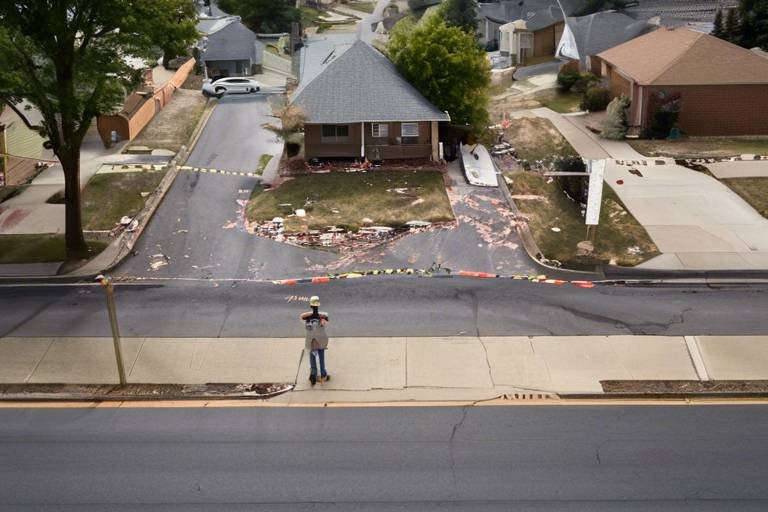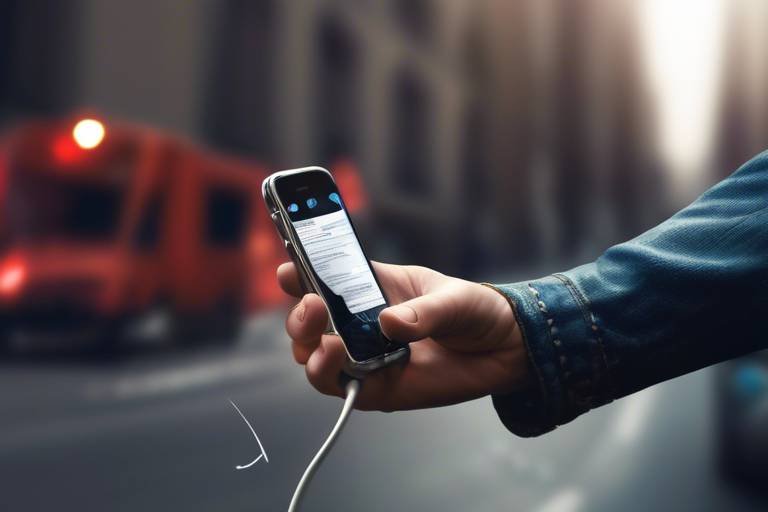Coping with Power Outages: A Safety Guide
Power outages can strike unexpectedly, leaving us in the dark—both literally and figuratively. Whether it's due to a fierce storm, a simple equipment malfunction, or human error, understanding how to cope with these situations is essential. This guide aims to equip you with essential tips and strategies for effectively managing power outages, ensuring your safety, and minimizing disruptions in your daily life. So, let's dive in and prepare ourselves for the next blackout!
To effectively cope with power outages, it's crucial to understand what causes them. Power outages can occur for several reasons, including:
- Weather Events: Severe storms, heavy winds, and ice can damage power lines and transformers.
- Equipment Failures: Aging infrastructure or faulty equipment can lead to unexpected outages.
- Human Error: Accidents during construction or maintenance can inadvertently cut power.
By knowing these triggers, you can better anticipate and prepare for potential disruptions in your power supply. It’s like being armed with a flashlight in the dark; you’ll feel more secure knowing what’s ahead.
Preparation is key to coping with power outages. By taking proactive steps, you can ensure that your family is safe and comfortable even when the lights go out. Start by gathering essential supplies and equipment that will help you weather the storm—literally and figuratively.
An emergency kit is crucial during power outages. Think of it as your survival toolbox. Here are some must-have items:
- Non-perishable Food: Canned goods, granola bars, and dried fruits can keep you nourished.
- Water: Aim for at least one gallon per person per day for at least three days.
- Medical Supplies: First aid kits and any necessary prescriptions should be readily available.
Having these items on hand can make all the difference when you're facing an unexpected power outage.
Stocking up on non-perishable food and sufficient water supplies is vital. During extended outages, you’ll want to ensure your family has enough to eat and drink. Store food in a cool, dry place and rotate supplies regularly to avoid spoilage. Consider using airtight containers to keep your food fresh and safe from pests. Remember, it's better to have too much than too little when it comes to food and water!
Don’t forget about your health needs. Having essential medical supplies on hand is crucial. This includes:
- Prescription medications
- First aid materials like band-aids and antiseptics
- Any special medical equipment you might need
In times of uncertainty, being prepared can give you peace of mind, allowing you to focus on what matters most—your family’s safety.
Exploring alternative power sources can provide comfort and safety during outages. Generators and solar panels can keep essential appliances running, making life a bit easier when the grid goes down. However, consider the following:
- Generators: They can power your refrigerator and medical devices, but ensure you know how to use them safely.
- Solar Panels: A sustainable option that can provide power even when the grid is down, but requires upfront investment.
These alternatives can be lifesavers, especially during prolonged outages. Just think of them as your backup dancers, ready to step in when the main act falters!
Safety is paramount during power outages. Knowing what to do can prevent accidents and ensure your family remains safe. For instance, avoid downed power lines and report them immediately. If you have a generator, keep it outside to prevent carbon monoxide poisoning.
Staying updated on the situation is vital. Use your smartphone to receive alerts about power outages and weather conditions. Local news channels and social media can also provide real-time updates. Think of it as your lifeline to the outside world when everything else goes dark.
Generators can be lifesavers during outages, but they must be used correctly. Always place your generator outdoors, far from windows and doors, to avoid carbon monoxide buildup. Keep the area around the generator clear and never refuel it while it’s running. Safety first!
Once the power is restored, it’s essential to assess any damage and resume normalcy. Check your appliances and food supplies for spoilage. If you notice any issues, take necessary precautions to avoid health hazards. Also, consider how you can improve your preparedness for future outages. Remember, every experience is a lesson learned!
Q: How long can food stay safe in a power outage?
A: Generally, a full freezer will keep food safe for about 48 hours if unopened, while a half-full freezer will last about 24 hours.
Q: What should I do if I have medical devices that require power?
A: Talk to your healthcare provider about backup plans, such as using a generator or finding a nearby facility with power.
Q: How can I prepare for future outages?
A: Regularly update your emergency kit, stay informed about local weather, and consider investing in alternative power sources.

Understanding Power Outages
Understanding power outages is crucial for anyone who wants to be prepared for unexpected disruptions. Power outages can occur for a variety of reasons, and knowing these causes can help you anticipate and respond more effectively. One of the most common causes is severe weather events, such as thunderstorms, hurricanes, or heavy snow. These natural occurrences can lead to downed power lines, which can leave entire neighborhoods in the dark.
Another significant factor is equipment failure. Just like any machine, electrical systems can malfunction. Aging infrastructure, faulty wiring, or even unexpected surges in demand can lead to outages. It’s not uncommon for a sudden spike in energy use to overwhelm a local grid, causing it to trip and shut down. Moreover, human error plays a role too. Accidental damage during construction or maintenance work can inadvertently disrupt power supply, leaving residents scrambling for solutions.
To illustrate the various causes of power outages, consider the following table:
| Cause | Description |
|---|---|
| Severe Weather | Storms, hurricanes, and snow can damage power lines and equipment. |
| Equipment Failure | Malfunctions in electrical systems can lead to outages. |
| Human Error | Accidents during construction or maintenance can disrupt power supply. |
So, what can we do when the lights go out? First, it’s essential to stay calm and assess the situation. Understanding that outages can happen for various reasons allows you to prepare mentally. You might wonder, “How long will the power be out?” Unfortunately, there’s often no immediate answer, which is why having a plan in place is vital. Keeping a battery-powered radio or a charged power bank can help you stay updated on the situation. Your local utility company usually provides updates through social media or their website, so staying connected can keep you in the loop.
In conclusion, recognizing the causes of power outages helps you prepare better. Whether it’s a storm rolling in or a simple equipment failure, being informed is your first line of defense. Equip your home with essential supplies, stay updated on weather conditions, and remember that preparation is key to managing these unexpected events.

Preparing Your Home
When it comes to coping with power outages, preparation is not just a good idea—it's essential. Imagine being caught in the dark with no flashlight, no food, and no plan. Sounds stressful, right? To avoid such a scenario, it's crucial to take proactive steps to ensure your home is ready for any unexpected power interruption. This means stocking up on essential supplies, having the right equipment, and implementing safety measures that can make a world of difference when the lights go out.
First off, let's talk about emergency kits. Think of these kits as your lifeline during an outage. They should include a variety of items that can sustain you and your family for at least 72 hours. Key components of an emergency kit include:
- Non-perishable food: Canned goods, dry snacks, and ready-to-eat meals.
- Water: At least one gallon per person per day for at least three days.
- Flashlights and batteries: Essential for navigating in the dark.
- First aid supplies: Bandages, antiseptics, and any personal medications.
Having these items readily available can take a huge weight off your shoulders when an outage strikes. But don't stop there—storing food and water properly is just as important. Make sure to keep your non-perishable food in a cool, dry place, and regularly check expiration dates. Similarly, store water in clean, food-grade containers, and consider rotating your supplies every six months to ensure freshness.
Now, let’s not forget about medical supplies. Having a well-stocked first aid kit is crucial, especially if you or a family member relies on specific medications. Ensure that you have at least a week’s supply of any prescription medications, along with over-the-counter remedies for common ailments. It's also wise to include items like gauze, adhesive tape, and antiseptic wipes in your kit. You never know when a small cut or scrape might need attention, and having these supplies on hand can help you manage minor injuries without a hassle.
In addition to these supplies, consider investing in alternative power sources. Generators and solar panels can provide you with power when the grid goes down. Generators, for instance, can keep your refrigerator running and your devices charged, giving you a sense of normalcy during an outage. However, it’s important to use them safely—never operate a generator indoors or in a garage, as this can lead to carbon monoxide poisoning. Solar panels, on the other hand, can be a sustainable option that not only helps during outages but also reduces your overall energy costs.
By taking the time to prepare your home with these supplies and measures, you can significantly reduce the stress and chaos that often accompany power outages. Remember, the goal is to create a safe and comfortable environment for you and your family, even when the lights go out. So, gather your supplies, set up your emergency kit, and consider your alternative power options. With a little planning, you'll be ready to face whatever comes your way!
Q: How often should I check my emergency kit?
A: It's recommended to check your emergency kit at least twice a year to ensure that all items are in good condition and that food and water supplies are not expired.
Q: What type of generator should I buy?
A: The best generator for you depends on your power needs. A portable generator is good for basic household items, while a standby generator can power your entire home during an outage.
Q: How can I keep my food from spoiling during an extended outage?
A: Keep your refrigerator and freezer doors closed as much as possible. A full freezer can keep food frozen for up to 48 hours if unopened.

Emergency Kits
When it comes to power outages, having an emergency kit is not just a luxury; it's a necessity. Think of it as your lifeline during those unexpected moments when the lights go out and the world outside seems to pause. An emergency kit can mean the difference between chaos and calm, providing you with the essential supplies needed to weather the storm—literally and figuratively. So, what should you include in your kit to ensure that you and your family are well-prepared?
First and foremost, you’ll want to stock up on non-perishable food items. These are the staples that can keep your energy levels up and your spirits high. Consider items like canned goods, dried fruits, and energy bars. Make sure to check expiration dates regularly, because no one wants to find out that their emergency stash has gone bad! Alongside food, having a sufficient supply of water is crucial. The general guideline is to have at least one gallon of water per person per day for at least three days. This ensures that you stay hydrated and can also be used for basic hygiene needs.
But food and water are just the beginning. You also need to think about medical supplies. This includes any prescription medications that you or your family members might need, as well as a basic first aid kit. It’s essential to have items such as band-aids, antiseptic wipes, and over-the-counter medications like pain relievers or allergy meds. If you have children or pets, consider their specific needs as well. You wouldn’t want to be caught off guard without the essentials!
In addition to these basics, it’s wise to include some tools and supplies that could come in handy during an outage. A flashlight with extra batteries, a multi-tool, and even a portable phone charger can make a world of difference. Imagine trying to navigate your home in the dark—having a flashlight can help you avoid accidents and keep your family safe. Plus, if you have a battery-operated radio, it can keep you informed about weather updates and restoration times, which is invaluable during an emergency.
Finally, don’t forget about personal items that will make your time at home more comfortable. This can include things like blankets, books, and games to keep spirits high. After all, a power outage doesn’t have to be a gloomy event; it can be an opportunity for family bonding and creativity! So, take some time to gather these items and store them in a designated emergency kit that’s easily accessible. Consider using a sturdy backpack or a plastic bin—whatever works best for your space.
In summary, preparing an emergency kit is about more than just gathering supplies; it’s about ensuring peace of mind. By taking the time to assemble a well-thought-out kit, you’re equipping yourself and your family with the tools needed to handle power outages effectively. Remember, it’s always better to be prepared than to be caught off guard!

Food and Water Supplies
When it comes to power outages, one of the most critical aspects to consider is your food and water supplies. Imagine being stuck in your home without electricity for hours or even days; the last thing you want is to run out of essential provisions. It's not just about having something to eat; it's about ensuring your family has enough nutritious food and clean water to stay healthy and hydrated during such emergencies.
First and foremost, non-perishable food items should be your go-to choice. Think canned goods, dried fruits, nuts, and granola bars. These items not only have a long shelf life but are also easy to prepare. You can grab a can of beans or a packet of oatmeal and be good to go without needing to cook. However, if you do have a camping stove or a portable grill, you can expand your menu options significantly. Just remember to stock up on fuel if you plan to cook!
Water is equally important, if not more so. The general rule of thumb is to store at least one gallon of water per person per day. This means if you have a family of four, you should aim for at least 12 gallons for a three-day outage. Water is crucial not only for drinking but also for cooking and hygiene. To store water safely, use clean, food-grade containers, and make sure to rotate your supplies every six months to keep everything fresh.
In addition to food and water, consider the following tips to enhance your supplies:
- Check Expiration Dates: Regularly check your pantry and replace any expired items to ensure you always have fresh supplies on hand.
- Plan Meals: Think ahead about meals you can prepare with your non-perishable items. This will help you avoid wasting food and ensure you have balanced meals during an outage.
- Special Dietary Needs: If anyone in your household has dietary restrictions, make sure to stock up on suitable options. This could include gluten-free products or specific nutritional supplements.
As you prepare, remember that the goal is to create a safety net that allows you to weather the storm—literally and figuratively. With a well-thought-out supply of food and water, you can rest a little easier during a power outage, knowing that you are ready for whatever comes your way.
Q: How long can I store non-perishable food items?
A: Most non-perishable foods can last for years if stored properly. Check the expiration dates and rotate your supplies regularly.
Q: Is tap water safe to drink during a power outage?
A: If your water supply comes from a municipal source, it is generally safe. However, if you rely on well water or if there are concerns about contamination, it’s best to store bottled water as a precaution.
Q: How often should I check my emergency supplies?
A: It’s a good idea to review your emergency supplies every six months to ensure everything is fresh and up to date.

Medical Supplies
When the lights go out, the last thing you want to worry about is whether you have the necessary to keep your family safe and healthy. Power outages can disrupt not only your daily routine but also your access to essential medications and health care needs. That's why having a well-stocked supply of medical essentials is crucial. Think of it as your health safety net—when everything else is uncertain, you want to make sure your health is secure.
First and foremost, it’s vital to have an adequate supply of any prescription medications that you or your family members may require. This includes not only daily medications but also any emergency prescriptions that could be needed in case of unforeseen circumstances. It's a good idea to keep at least a week's worth of medications on hand, stored in a cool, dry place to maintain their efficacy.
In addition to medications, consider having a well-equipped first aid kit ready for use. A comprehensive first aid kit should contain items such as:
- Adhesive bandages in various sizes
- Antiseptic wipes and ointments
- Gauze pads and adhesive tape
- Scissors and tweezers
- Pain relievers like ibuprofen or acetaminophen
Furthermore, don't overlook the importance of having items that cater to specific health needs. For example, if someone in your household has a chronic condition, ensure you have the necessary supplies to manage that condition. This could include:
- Asthma inhalers or nebulizers
- Diabetes testing supplies like glucose monitors and test strips
- Any specialized equipment, such as CPAP machines, along with backup batteries
Lastly, consider adding some basic health and hygiene items to your medical supplies. These can help prevent illness during extended outages. Stock up on:
- Hand sanitizers and disinfectant wipes
- Thermometers to monitor any fevers
- Hydration solutions like electrolyte packets
In summary, being prepared with the right medical supplies not only ensures your family's well-being during power outages but also offers peace of mind. Just as you wouldn't leave home without your wallet, don’t leave your health to chance. Prepare now, and you’ll be ready for whatever comes your way!
Q: How often should I check my medical supplies?
A: It's advisable to check your medical supplies every six months to ensure that nothing is expired and that you have everything you need.
Q: What should I do if I run out of prescription medications during an outage?
A: Contact your pharmacy as soon as possible. Many pharmacies have emergency protocols in place to help patients refill prescriptions during outages.
Q: Are there any specific items I should include for children or infants?
A: Yes, if you have young children, ensure you have pediatric medications, infant formula, and any necessary supplies like diapers and wipes.
Q: How can I keep my medications safe during a power outage?
A: Store medications in a cool, dry place, and if your home loses power, avoid opening the refrigerator or freezer unnecessarily to maintain temperature.

Alternative Power Sources
When the lights go out, the last thing you want is to feel helpless in the dark. Fortunately, there are several that can help keep your home running smoothly during a power outage. Think of these alternatives as your backup plan, ready to swoop in like a superhero when the power grid fails. Two of the most popular options are generators and solar panels, each with its own set of benefits and considerations.
Generators are often the go-to solution for many households. They can power essential appliances, such as refrigerators and heating systems, allowing you to maintain a semblance of normalcy. However, it's crucial to choose the right type of generator for your needs. There are two main categories: portable generators and standby generators. Portable generators are versatile and can be moved around as needed, while standby generators are permanently installed and kick in automatically when the power goes out. Both types have their advantages, but they also come with safety considerations. For instance, portable generators must be used outdoors to avoid carbon monoxide poisoning, while standby generators require professional installation.
On the other hand, solar panels are an eco-friendly alternative that can provide power even when the grid is down. If you're already harnessing the sun's energy, you might have a battery storage system that allows you to store excess energy for use during outages. This not only reduces your reliance on fossil fuels but also lowers your electricity bills over time. However, the initial investment can be steep, and you need to ensure your solar system is appropriately sized for your household's energy needs.
Here’s a quick comparison of both options:
| Feature | Generators | Solar Panels |
|---|---|---|
| Installation | Easy to set up (portable) or professional installation (standby) | Requires professional installation and setup |
| Cost | Lower initial cost for portable; higher for standby | Higher initial investment, but savings over time |
| Environmental Impact | Fossil fuel emissions | Renewable energy source |
| Power Duration | Depends on fuel supply | Limited by battery capacity (if equipped) |
Ultimately, the choice between generators and solar panels depends on your specific needs, budget, and environmental considerations. It’s essential to evaluate your household's energy requirements and how long you expect to be without power. By investing in one of these , you can ensure that you and your family stay safe and comfortable, even when the grid goes down.
- How much power do I need from a generator? - It depends on what appliances you want to run. Calculate the wattage of each appliance to determine your needs.
- Can solar panels work during a power outage? - Yes, if you have a battery storage system, you can use solar energy even when the grid is down.
- Are generators noisy? - Most portable generators can be quite loud, but some models are designed to operate more quietly.

Safety Precautions During Outages
When the lights go out, it can feel like the world has come to a standstill. But instead of panicking, it’s crucial to stay calm and focus on safety. Power outages can happen for various reasons, from severe weather to equipment failure, and knowing how to navigate these situations can make all the difference. One of the first things to remember is to avoid any downed power lines. These can be extremely dangerous, carrying high voltage that can lead to severe injuries or even fatalities. If you see a downed line, keep a safe distance and report it to your local utility company immediately.
Another important precaution is to ensure that your home is equipped with emergency lighting. Flashlights are great, but don’t forget to stock up on batteries and consider using battery-powered lanterns to illuminate larger areas. Candles may seem like a cozy alternative, but they pose a fire risk, especially in homes with pets or small children. Instead, opt for LED lights that are safe and energy-efficient.
Staying informed during an outage is vital. Make sure you have a battery-operated radio or a portable charger for your smartphone. This way, you can receive updates from local authorities about the situation. Additionally, consider signing up for alerts from your utility company. Many utilities offer text or email notifications about outages and restoration times, which can help you plan accordingly.
Using generators can provide a sense of comfort during prolonged outages, but they must be handled with care. Always place generators outdoors in a well-ventilated area to prevent carbon monoxide buildup. This colorless, odorless gas can be deadly, so investing in a carbon monoxide detector for your home is a wise move. When connecting appliances, make sure to use heavy-duty extension cords rated for the generator's output. This helps avoid overheating and potential fires.
Lastly, keep your refrigerator and freezer doors closed as much as possible to retain cold air. A full freezer can keep food frozen for 48 hours if unopened, while a half-full freezer will last about 24 hours. If the power is out for an extended period, check food safety guidelines to avoid consuming spoiled items.
- What should I do if I see a downed power line?
Stay away from it and report it to your utility company immediately.
- Can I use candles during a power outage?
While they can provide light, candles pose a fire risk. It’s safer to use battery-powered lights.
- How can I keep my food from spoiling during an outage?
Keep fridge and freezer doors closed and consume perishables first. A full freezer can last 48 hours without power.
- Is it safe to use a generator indoors?
No, generators should always be used outdoors to prevent carbon monoxide poisoning.

Staying Informed
When the lights go out and the world around you is enveloped in darkness, staying informed becomes your lifeline. It's like being a sailor lost at sea; without a compass, you could drift aimlessly. In the midst of a power outage, knowing what's happening around you is crucial for your safety and well-being. So, how do you keep yourself updated during these unexpected events?
First and foremost, consider investing in a battery-operated or hand-crank radio. This little gadget can be a game-changer! It allows you to tune into local news stations that provide real-time updates on the situation, including information about the duration of the outage and any safety warnings. Just imagine sitting in your living room, sipping a warm cup of tea, while listening to the reassuring voice of a news anchor guiding you through the storm outside.
Another smart move is to download a few essential mobile apps on your smartphone. Many utility companies offer apps that send notifications about outages and restoration timelines. Additionally, weather apps can provide alerts about severe weather conditions that might be causing the power outage. Just remember, if your phone battery is running low, prioritize conserving it for emergencies!
Don’t forget about social media! Platforms like Twitter and Facebook can be valuable resources during an outage. Many local authorities and utility companies post updates on their social media accounts. Following these accounts can keep you in the loop and help you understand the broader context of the outage. However, be cautious of misinformation; always cross-check facts from reliable sources.
Lastly, consider connecting with your neighbors. In times of crisis, community bonds become stronger. A simple chat over the fence can yield valuable information. Perhaps your neighbor has a battery-operated TV or another way to access news. Sharing resources and information can make a significant difference in how you cope with the situation.
In summary, staying informed during a power outage involves a combination of technology, community engagement, and resourcefulness. By preparing ahead of time and utilizing various sources of information, you can navigate through the uncertainty with confidence and safety.
- What should I do if I lose power? First, check to see if it's a widespread outage or just your home. Report the outage to your utility company and follow safety precautions.
- How long can food stay good in a power outage? Generally, a full freezer can keep food frozen for about 48 hours if unopened. A half-full freezer will keep food for about 24 hours.
- Is it safe to use candles during a power outage? While candles can provide light, they pose a fire hazard. It's safer to use flashlights or battery-operated lanterns.
- How do I prepare for a power outage? Create an emergency kit with food, water, medical supplies, and a communication plan. Stay informed and have backup power sources if possible.

Using Generators Safely
When the lights go out, a generator can feel like a superhero swooping in to save the day. However, using a generator safely is crucial to ensure that it truly acts as a lifeline rather than a hazard. First and foremost, it’s essential to position your generator outdoors, away from any doors, windows, or vents. This helps prevent the dangerous buildup of carbon monoxide, a colorless and odorless gas that can be lethal. Imagine your generator is like a campfire; you wouldn’t want to set up your tent right next to it, right? Similarly, maintaining a safe distance is key.
Another critical aspect of generator safety is using the correct extension cords. Opt for heavy-duty cords that are rated for outdoor use. This is not just a recommendation but a necessity to avoid overheating and potential fires. Think of these cords as the lifeline between your generator and your home; they need to be strong and reliable. Additionally, ensure that the total wattage of the devices you connect does not exceed the generator's capacity. Overloading your generator is like trying to carry too many groceries at once—it’s just not going to end well!
It's also important to keep your generator dry. If it starts to rain, make sure to cover it with a tarp or a specially designed generator cover. Just like you wouldn’t want your phone to get wet, your generator should stay dry to function properly. Furthermore, always turn off the generator and let it cool down before refueling. Adding fuel to a hot generator can lead to fires or explosions, which is definitely not the kind of excitement you want during a power outage!
Here are some additional safety tips to keep in mind:
- Read the Manual: Always familiarize yourself with the manufacturer's instructions before operating your generator.
- Install Carbon Monoxide Detectors: These detectors can alert you to any dangerous gas levels in your home.
- Never Use a Generator Indoors: This includes garages, basements, or any enclosed spaces.
Lastly, consider investing in a transfer switch if you plan to connect your generator directly to your home’s electrical system. This switch ensures that power is safely redirected from the generator to your home without back-feeding into the grid, which can endanger utility workers trying to restore power. It’s like having a secure bridge between two islands—keeping everything safe and sound.
In conclusion, while generators can provide much-needed power during outages, safety should always be your top priority. By following these guidelines, you can ensure that your generator serves its purpose without any unintended consequences. Remember, the goal is to keep your family safe while navigating the challenges of a power outage.

Post-Outage Recovery
Once the power is restored, it can feel like a huge weight has been lifted off your shoulders. However, the aftermath of a power outage requires careful attention to ensure that your home and family are safe and sound. First things first, take a moment to breathe and appreciate the return of electricity, but don’t get too comfortable just yet. There are several important steps to follow to assess any potential damage and resume your normal routine.
Start by checking your home for any signs of damage. This includes inspecting appliances, electronics, and any perishable food items that may have been affected during the outage. It’s essential to throw away any food that has been sitting in the fridge for too long without power, as it could pose a health risk. As a general rule, if the power has been out for more than four hours, it’s wise to discard perishable items such as meat, dairy, and eggs.
Next, take a look at your electrical systems. Sometimes, power surges can occur when electricity is restored, which can damage sensitive equipment. If you notice any flickering lights or appliances that aren’t functioning properly, it may be worth consulting a professional electrician to ensure everything is safe and operational. Remember, it’s better to be safe than sorry!
Another crucial aspect of post-outage recovery is to check your emergency supplies. After an outage, you may find that some of your supplies have been depleted. This is a perfect time to restock your emergency kit, ensuring that you have enough food, water, and medical supplies for the next unexpected event. Here’s a quick checklist of items to consider replenishing:
- Non-perishable food items
- Water (at least one gallon per person per day)
- Flashlights and batteries
- First aid supplies
- Medications and prescriptions
Additionally, consider reviewing your emergency plan with your family. Discuss what went well during the outage and what could be improved for next time. This reflection can help everyone feel more prepared and confident in handling future emergencies. Communication is key; make sure everyone knows what to do if the lights go out again.
Lastly, once everything is checked and restocked, take a moment to relax. Power outages can be stressful, and it's important to prioritize your mental well-being. Engage in activities that you enjoy, whether it’s reading a book, watching a movie, or simply enjoying a warm cup of coffee in the comfort of your home. Remember, you’ve made it through the storm, and now it’s time to enjoy the calm.
To help you navigate the complexities of power outages, here are some common questions and answers:
| Question | Answer |
|---|---|
| What should I do if my food spoils during a power outage? | Discard any perishable food items that have been above 40°F for more than two hours. |
| How can I prevent damage to my electronics during a power outage? | Unplug sensitive electronics to prevent damage from power surges when power is restored. |
| Is it safe to use candles during a power outage? | While candles can provide light, they pose a fire risk. Use flashlights or battery-operated lights instead. |
| How often should I check my emergency supplies? | Review your emergency supplies every six months to ensure everything is up to date and functional. |
Frequently Asked Questions
- What should I do during a power outage?
During a power outage, the first step is to stay calm. Check if your neighbors are also affected. If it's safe, avoid opening the refrigerator or freezer to keep food from spoiling. Use flashlights instead of candles to prevent fire hazards, and unplug sensitive electronics to protect them from power surges when electricity is restored.
- How can I prepare my home for a power outage?
Preparation is key! Start by putting together an emergency kit that includes non-perishable food, water, batteries, flashlights, and a first aid kit. Make sure you have a battery-operated radio to stay informed about updates. It’s also smart to have a plan in place for your family, including a designated meeting spot if you get separated.
- What alternative power sources can I use?
Alternative power sources like generators and solar panels can be lifesavers during an outage. Generators provide immediate power for essential appliances, but they must be used safely outdoors to avoid carbon monoxide poisoning. Solar panels can help charge devices and maintain some electricity, but ensure you have the right setup and batteries for storage.
- How do I stay informed about power outages?
Staying informed is crucial! You can sign up for local alerts from your utility company to receive updates about outages and restoration times. Additionally, follow local news stations on social media or listen to a battery-operated radio for the latest information during severe weather events.
- What safety precautions should I take during a power outage?
Safety is paramount! Always stay away from downed power lines and report them immediately to your utility provider. If using a generator, ensure it's placed outside and away from windows to prevent carbon monoxide buildup. Avoid using gas stoves or grills indoors for heating, as they can produce toxic fumes.
- What should I do after the power is restored?
Once the power returns, check your appliances to ensure they're functioning correctly. Inspect your home for any damage caused by the outage, such as spoiled food or water leaks. It's also a good idea to reset any digital clocks and check your emergency supplies to replenish anything used during the outage.



















